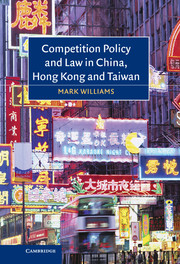Book contents
- Frontmatter
- Contents
- Preface
- Acknowledgements
- List of abbreviations
- 1 Introduction and methodology
- 2 Competition theory and the experience of states adopting competition law
- 3 The international perspective
- 4 China and economic regulation – history, politics and economics
- 5 Existing and proposed Chinese competition provisions
- 6 Competitive Hong Kong? myths, perception and reality
- 7 Implementation of competition policy in Hong Kong 1997–2004: economising with the truth
- 8 Electricity, telecommunication and broadcasting: competition regulation Hong Kong style
- 9 Taiwan - the third China
- 10 Political economy: an explanation of competition policy in Greater China
- 11 Competition policy and law in Greater China: where next?
- Bibliography
- Index
7 - Implementation of competition policy in Hong Kong 1997–2004: economising with the truth
Published online by Cambridge University Press: 28 July 2009
- Frontmatter
- Contents
- Preface
- Acknowledgements
- List of abbreviations
- 1 Introduction and methodology
- 2 Competition theory and the experience of states adopting competition law
- 3 The international perspective
- 4 China and economic regulation – history, politics and economics
- 5 Existing and proposed Chinese competition provisions
- 6 Competitive Hong Kong? myths, perception and reality
- 7 Implementation of competition policy in Hong Kong 1997–2004: economising with the truth
- 8 Electricity, telecommunication and broadcasting: competition regulation Hong Kong style
- 9 Taiwan - the third China
- 10 Political economy: an explanation of competition policy in Greater China
- 11 Competition policy and law in Greater China: where next?
- Bibliography
- Index
Summary
Introduction
Since the Hong Kong government's Response in 1997, the issue of competition policy has not faded into the background. Academic debate and investigation has continued, the Consumer Council has continued to lobby for a change of policy by government, some political parties have attempted to raise the matter in LEGCO, and civic organisations and the media have become more interested in the issue as HongKong's post-1997 performance deteriorated; concurrently the government has been faced with a continuing string of competition-related problems. COMPAG has been activated to handle competition issues and there have been major legislative developments in the telecommunications and broadcasting sectors. This chapter will seek to analyse the ongoing competition debate in Hong Kong.
Government competition policy in action: the Policy Statement
If the government's approach outlined in the 1997 Response were correct, one would have expected few, if any, competition-related problems since that time. However, this has not been the case. Particular issues will be identified and examined below as will the practical implementation of the Competition Policy Statement and the work of COMPAG.
In the next chapter, the interesting paradox of the government's stated position on competition regulation will be contrasted with the introduction of full sectoral competition regulation in two industries – telecommunications and broadcasting. This is the perfect example of the government's schizophrenic approach to this subject. Presumably only these two industries suffered from or were in danger of suffering anti-competitive activities so justifying the imposition of comprehensive regulation, whilst the rest of the economy did not suffer in this way, so justifying the lack of legislative intervention.
- Type
- Chapter
- Information
- Competition Policy and Law in China, Hong Kong and Taiwan , pp. 271 - 300Publisher: Cambridge University PressPrint publication year: 2005



